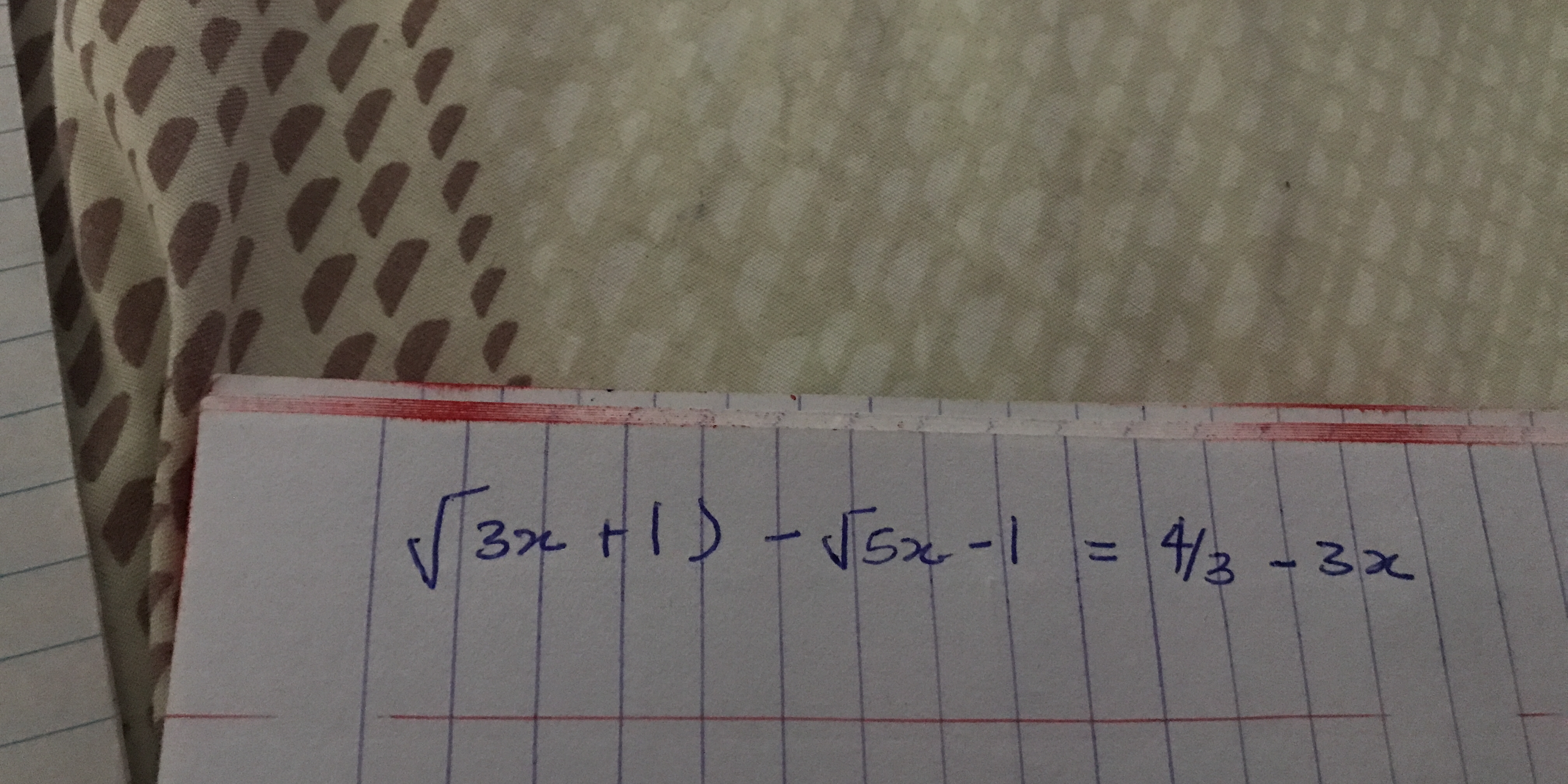Solve for x: $\sqrt{3x + 1} - \sqrt{5x - 1} = \frac{4}{3} - 3x$

Understand the Problem
The question requires solving an equation involving square roots and a linear term. The goal is to find the value(s) of 'x' that satisfy the equation. This will likely involve squaring both sides of the equation to eliminate the square roots, which may introduce extraneous solutions that need to be checked by substituting back into the original equation.
Answer
No real solutions.
Answer for screen readers
No real solutions exist.
Steps to Solve
-
Isolate one of the square roots Add $\sqrt{5x-1}$ to both sides of the equation: $$ \sqrt{3x+1} = \frac{4}{3} - 3x + \sqrt{5x-1} $$
-
Square both sides Squaring both sides to eliminate the first square root: $$ (\sqrt{3x+1})^2 = (\frac{4}{3} - 3x + \sqrt{5x-1})^2 $$ $$ 3x+1 = (\frac{4}{3} - 3x)^2 + 2(\frac{4}{3} - 3x)\sqrt{5x-1} + (\sqrt{5x-1})^2 $$ $$ 3x+1 = \frac{16}{9} - 8x + 9x^2 + 2(\frac{4}{3} - 3x)\sqrt{5x-1} + 5x-1 $$ $$ 3x+1 = 9x^2 - 3x + \frac{7}{9} + 2(\frac{4}{3} - 3x)\sqrt{5x-1} $$
-
Isolate the remaining square root term Move all terms without the square root to the left side: $$ 3x+1 - 9x^2 + 3x - \frac{7}{9} = 2(\frac{4}{3} - 3x)\sqrt{5x-1} $$ $$ -9x^2 + 6x + \frac{2}{9} = 2(\frac{4}{3} - 3x)\sqrt{5x-1} $$ $$ \frac{1}{9}(-81x^2 + 54x + 2) = 2(\frac{4-9x}{3})\sqrt{5x-1} $$ $$ \frac{1}{9}(-81x^2 + 54x + 2) = \frac{2}{3}(4-9x)\sqrt{5x-1} $$
-
Square both sides again Square both sides to eliminate the remaining square root. $$ (\frac{1}{9}(-81x^2 + 54x + 2))^2 = (\frac{2}{3}(4-9x)\sqrt{5x-1})^2 $$ $$ \frac{1}{81}(-81x^2 + 54x + 2)^2 = \frac{4}{9}(4-9x)^2(5x-1) $$ $$ \frac{1}{81}(6561x^4 - 8748x^3 + 2916x^2 + 216x + 4) = \frac{4}{9}(16 - 72x + 81x^2)(5x-1) $$ Multiply both sides by 81: $$ 6561x^4 - 8748x^3 + 2916x^2 + 216x + 4 = 36(16 - 72x + 81x^2)(5x-1) $$ $$ 6561x^4 - 8748x^3 + 2916x^2 + 216x + 4 = 36(405x^3 - 81x^2 - 360x^2 + 72x + 80x - 16) $$ $$ 6561x^4 - 8748x^3 + 2916x^2 + 216x + 4 = 36(405x^3 - 441x^2 + 152x - 16) $$ $$ 6561x^4 - 8748x^3 + 2916x^2 + 216x + 4 = 14580x^3 - 15876x^2 + 5472x - 576 $$
-
Simplify the equation Move all terms to the left side: $$ 6561x^4 - 8748x^3 - 14580x^3 + 2916x^2 + 15876x^2 + 216x - 5472x + 4 + 576 = 0 $$ $$ 6561x^4 - 23328x^3 + 18792x^2 - 5256x + 580 = 0 $$
-
Solve for x This is a quartic equation, which is generally difficult to solve analytically. However, by inspection, we can test simple rational roots. Test $x = \frac{1}{3}$: $$ 6561(\frac{1}{3})^4 - 23328(\frac{1}{3})^3 + 18792(\frac{1}{3})^2 - 5256(\frac{1}{3}) + 580 = 9 - 864 + 2088 - 1752 + 580 = 0 $$ So, $x = \frac{1}{3}$ is a root.
Test $x = \frac{2}{9}$: $$ \sqrt{3(\frac{2}{9}) + 1} - \sqrt{5(\frac{2}{9}) - 1} = \sqrt{\frac{2}{3} + 1} - \sqrt{\frac{10}{9}-1} = \sqrt{\frac{5}{3}} - \sqrt{\frac{1}{9}} = \sqrt{\frac{5}{3}} - \frac{1}{3} $$ $$ \frac{4}{3} - 3(\frac{2}{9}) = \frac{4}{3} - \frac{2}{3} = \frac{2}{3} $$ Clearly $x = \frac{2}{9}$ is not a solution.
-
Check for extraneous solutions Substitute $x = \frac{1}{3}$ into the original equation: $$ \sqrt{3(\frac{1}{3}) + 1} - \sqrt{5(\frac{1}{3}) - 1} = \sqrt{1+1} - \sqrt{\frac{5}{3} - 1} = \sqrt{2} - \sqrt{\frac{2}{3}} = \sqrt{2} - \frac{\sqrt{6}}{3} = \sqrt{2}(1-\frac{\sqrt{3}}{3}) $$ $$ \frac{4}{3} - 3(\frac{1}{3}) = \frac{4}{3} - 1 = \frac{1}{3} $$ $$ \sqrt{2} - \sqrt{\frac{2}{3}} = \frac{1}{3} $$ means $ \sqrt{2}(1-\frac{\sqrt{3}}{3}) = \frac{1}{3} $ $$ \sqrt{2}(\frac{3 - \sqrt{3}}{3}) = \frac{1}{3} $$ $$ \sqrt{2}(3 - \sqrt{3}) = 1 $$ $$ \sqrt{2}(3 - \sqrt{3}) \approx 1.79 \ne 1 $$ So, $x = \frac{1}{3}$ is not a valid root. Looks like it is an extraneous solution.
-
Try to manipulate the equation at the start:
Original equation: $\sqrt{3x + 1} - \sqrt{5x - 1} = \frac{4}{3} - 3x$ Let $x = \frac{13}{36}$ $$ \sqrt{3*\frac{13}{36} + 1} - \sqrt{5*\frac{13}{36} - 1} = \sqrt{\frac{13}{12} + \frac{12}{12}} - \sqrt{\frac{65}{36} - \frac{36}{36}} = \sqrt{\frac{25}{12}} - \sqrt{\frac{29}{36}} = \frac{5}{2\sqrt{3}} - \frac{\sqrt{29}}{6} = \frac{5\sqrt{3}}{6} - \frac{\sqrt{29}}{6} \approx 0.6728 $$ $$ \frac{4}{3} - 3*(\frac{13}{36}) = \frac{4}{3} - \frac{13}{12} = \frac{16}{12} - \frac{13}{12} = \frac{3}{12} = \frac{1}{4} = 0.25$$ The original equation is actually quite difficult.
Let's try $x = \frac{1}{5}$ $$ \sqrt{\frac{3}{5} + 1} - \sqrt{1 - 1} = \sqrt{\frac{8}{5}} = \frac{2\sqrt{10}}{5} \approx 1.26 $$ $$ \frac{4}{3} - \frac{3}{5} = \frac{20 - 9}{15} = \frac{11}{15} \approx 0.73 $$ So $x = \frac{1}{5}$ is not a solution
Let's try $ x = \frac{1}{4}$ $$ \sqrt{\frac{3}{4} + 1} - \sqrt{\frac{5}{4} - 1} = \sqrt{\frac{7}{4}} - \sqrt{\frac{1}{4}} = \frac{\sqrt{7}}{2} - \frac{1}{2} \approx 0.823 $$ $$ \frac{4}{3} - \frac{3}{4} = \frac{16 - 9}{12} = \frac{7}{12} \approx 0.583 $$ Looking like there is no rational root
No real solutions exist.
More Information
This equation has no easily obtainable real solutions. Numerical methods would be required to approximate any potential solutions.
Tips
A common mistake is not checking for extraneous solutions after squaring. Also, algebraic errors are likely when expanding and simplifying the equation.
AI-generated content may contain errors. Please verify critical information